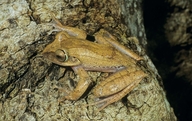|
Description
M ca. 45-50 mm. Male specimens from Benavony measure 46-49 mm and their tibiotarsal articulation reaches between nostril and snout tip. Hand with some webbing, foot webbing 1(0), 2i(0.5), 2e(0), 3i(1), 3e(0.5), 4i/e(1), 5(0.5). Dorsal skin smooth. Relatively small but distinct spiny tubercles on heel and elbow. Males with nuptial pads and a weakly distensible single subgular vocal sac. Dorsally light brown, typically with a large darker central patch.
Similar species:
Boophis madagascariensis differs
by call, is larger and has larger dermal flaps on the heels and elbows; B. reticulatus and B.
burgeri are smaller and have a network of elevated ridges on the
back.
Distribution and Habitat
Country distribution from AmphibiaWeb's database: Madagascar
Benavony, Manongarivo, Montagne d’Ambre, Nosy Be. It is observed at 1600 m asl.
This species lives in rainforest, dry forest, and savannah, and breeds in streams (Andreone et al. 2008).
Life History, Abundance, Activity, and Special Behaviors
Habits: Males call at night in the vegetation 1-2 m above the ground along streams in rainforest.
Calls: Consisting of a longer moaning note and a shorter note arranged in series.
Eggs and tadpoles:
Eggs unknown. Tadpoles which possibly belong to this species were found in brooks.
Juveniles possibly belonging to this species are similar to Boophis
in colouration.
Trends and Threats
Data Deficient: uncertainties related to extent of occurrence, status and ecological requirements. It occurs in many protected areas (Andreone et al. 2008). Possible reasons for amphibian decline General habitat alteration and loss
Habitat modification from deforestation, or logging related activities
Intensified agriculture or grazing
Urbanization
Habitat fragmentation
Comments
Taken with permission from Glaw and Vences (2007).
References
Andreone, F., Vences, M., and Glaw, F. (2008). Boophis brachychir. In: IUCN 2008. 2008 IUCN Red List of Threatened Species. www.iucnredlist.org. Downloaded on 08 April 2009.
Glaw, F. and Vences, M. (1994). Amphibians and Reptiles of Madagascar. M. Vences and F. Glaw Verlags GbR., Köln.
Glaw, F., and Vences, M. (2007). Field Guide to the Amphibians and Reptiles of Madagascar. Third Edition. Vences and Glaw Verlag, Köln.
Originally submitted by: Miguel Vences and Frank Glaw (first posted 2000-10-30)
Edited by: Henry Zhu (2009-05-05)Species Account Citation: AmphibiaWeb 2009 Boophis brachychir <https://amphibiaweb.org/species/4335> University of California, Berkeley, CA, USA. Accessed Jun 1, 2025.
Feedback or comments about this page.
Citation: AmphibiaWeb. 2025. <https://amphibiaweb.org> University of California, Berkeley, CA, USA. Accessed 1 Jun 2025.
AmphibiaWeb's policy on data use.
| 